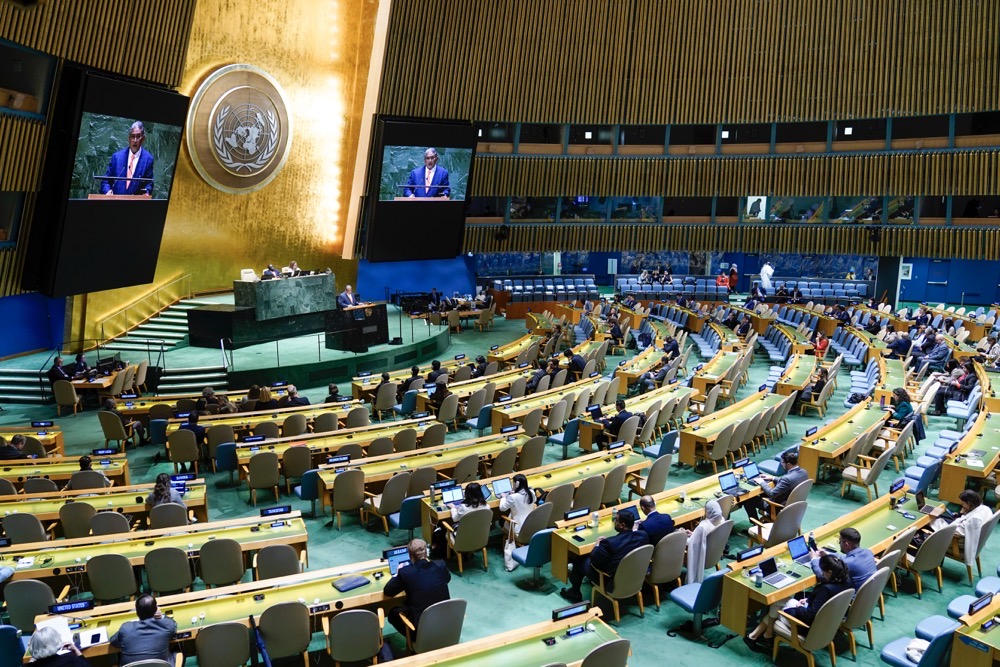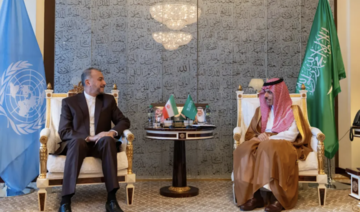NEW YORK CITY: As the world grapples with challenges ranging from sustainable development to climate change and conflicts, the global conversation has been increasingly dominated by the evolving landscape of multilateralism, the role of emerging powers, and the imperative for cooperation on such matters as migration and human rights.
On the margins of the 78th session of the UN General Assembly, Danilo Turk, a former president of Slovenia and current president of Club de Madrid, an organization comprising former heads of state or government from across the globe, shared his insights with Arab News on some of the burning issues of the day.
The UN is an old home for Turk, who was his country’s first UN ambassador, and this latest visit is in the capacity of president of Club de Madrid.
This organization, representing 126 former leaders from 73 countries, maintains deep-rooted connections with the UN, with many of its members serving as special envoys of the UN secretary-general.

Heads of state or government descended on the UN headquarters in New York City. (AFP)
According to Turk, the UN is in a state of transformation, growing larger and more diverse, involving not only member states but an array of global actors. He said a visit to the UN today reveals a complex world coming together, seeking solutions to global challenges.
One of the key priorities that Turk and Club de Madrid brings to the UNGA is a spotlight on Sustainable Development Goals, with a special emphasis on social development.
“Sustainable Development Goals are not only about the environment, if I may put it so crudely. It’s about the whole transformation of societies, new social-development models. And we have got to start discussing this very seriously,” he said.
A robust SDG political declaration adopted last week by member states emphasized the need to intensify efforts toward the Summit for the Future next year and the World Social Summit in 2025.
These gatherings, conceptualized and promoted by Club de Madrid, of which UN chief Antonio Guterres is a member, serve as vital platforms to solidify strategies and approaches to development models, “measuring social development in ways which are more comprehensive, giving appropriate space for women to play a full role in the social development process and making other priorities more clearly defined.”
Turk described a conference slated to be held in Brazil in November as a crucial step in shaping this approach. Financing these endeavors poses a challenge, which is why Turk underscored the necessity of aligning financial resources with social-development priorities.
“Public and private finance should be combined in new ways,” he said. “More capacity of private finance should be brought into the picture. But also, on the other hand, public finance must take more risks than was the case so far.”
The overarching theme of this year's UNGA has been multilateralism, a concept that has sparked debates about its viability and relevance. Some diplomatic circles at the UN repeat often that, as conflicts proliferate and inequity widens, the multilateral system has become dysfunctional, if not completely defunct, while its advocates continue to defend its relevance.

Danilo Turk is a former president of Slovenia and current president of Club de Madrid (Arab News photo)
The conclusion of the BBNJ Treaty, an important addition to the international architecture on the Law of the Sea, and the inclusion of loss and damage in the COP27 agreement, which aims to provide financial assistance to poorer nations as they deal with the negative consequences that arise from the risks of climate change, are two examples of success that demonstrate that multilateralism can indeed deliver results, according to its advocates.
Turk acknowledged the “very serious changes and transformations” the global landscape is undergoing. He observed that the world is no longer unipolar. With the liberal unipolar period coming to an end, a new multipolar world is taking shape, introducing complexities in global dynamics.
He said: “The world is (no) longer under the domination of the liberal, unipolar period. This has changed. And now, a new multipolar world is emerging, and it is not yet entirely clear how the relations among new centers of power in the world will look. And those new centers, of course, they have always been there, but they haven’t had the kind of critical role that they are now assuming, in the context of BRICS, for example.”
As the relations among these new centers of power evolve, patient diplomacy remains key to avoiding crises, Turk said.
He added: “We’ve got to be (very) patient because it’s not going to happen overnight. But (we have also got to be) attentive; things can get out of hand.”
In this context, multilateral frameworks, including the UN, continue to be valuable because they offer a crucial gathering space for people worldwide, Turk said.
“If nothing else, the United Nations is a wonderful meeting place, a place where everybody comes, a place where everybody can meet, a place where clarifications can be made in a wide variety of informal, discreet ways in the United Nations building and elsewhere. And that is what the charter of the United Nations has asked the United Nations to be. And that is the function that the United Nations is performing.
“So, I am not excessively pessimistic. I am concerned, but I am not a pessimist.”

As the relations among these new centers of power evolve, patient diplomacy remains key to avoiding crises, Turk said. (AFP/AP)
The 2030 Agenda for Sustainable Development marked a significant milestone as the first ever fully negotiated, all-encompassing global development strategy formally embraced by both the Global South and the developed world. It was widely celebrated as the dawn of a new era in development collaboration.
Despite significant development gains globally, which have raised many millions of people out of absolute poverty, the UN says that inequality between the world’s richest and poorest countries is widening, an anomaly that was particularly spotlighted at UNGA this year, where it has become clear that the Global South and the Global North are coming to issues from diametrically opposed positions.
Reflecting on the dynamic between the developed and developing worlds, Turk said: “The problem is, as it has always been, the whole question of understanding of development.”
He added: “You know, there are inequalities between states, which are growing. There is a diminished fiscal space in much of the developing world. There is a problem of migration which has gone out of control. And none of these problems is new. All of them have been there before. What is now needed is a kind of renewed effort. The United Nations is offering (not only) a good institutional framework, but also a platform for searching for solutions.”
Referring to the grouping of Brazil, Russia, India, China and South Africa, Turk said: “I am quite encouraged by the fact that initiatives are emerging, that BRICS is becoming more and more — I shouldn’t say assertive — certainly more imaginative … the group of countries together in the BRICS and so forth.
“In short, the agenda is not new at all. The configuration of power and potential of new actors is there, and it will have to be reflected in solutions.
FASTFACTS
• Danilo Turk lauded Saudi Arabia’s awareness of ‘its growing responsibility and global responsibility’ as ‘good for the world.’
• Club de Madrid is composed of 126 members from 73 countries.
“In the old days we had G77 and that kind of a very bloc-like, North-South dialogue. This is now much more diverse, much more imaginative, much more, I would say, promising. And the North has got to listen. I think that the problem is that the North is not used to listening (to) the messages that are coming from the South. The North has to start to listen.”
In this emerging global political landscape, Turk highlighted the transformative role of emerging powers, including Saudi Arabia.
He observed that the Kingdom is playing an increasingly prominent role not only in the Middle East but also on the international stage, particularly in the context of climate change.
“Saudi Arabia (is) developing a very large number of new policies and new activism at the global level. Now, this is new, and it is not easy to develop a new pattern based on the fact of multipolarity,” he said.
Elaborating on the point, Turk said Saudi Arabia had always been an important player in the Middle East context, but was now an important player in a global context, “and that's different.”
He added: “When it comes to climate, for example, now I think the countries that have benefited from the high energy prices in the past period have an opportunity to invest the proceeds in ways that actually help to achieve the Sustainable Development Goals and also save the planet. So, we see the responsibility of Saudi Arabia is now much larger because the power is much larger.
“It is fortunate that Saudi Arabia seems to be on the path of assuming this larger responsibility. That’s very good. Of course, I cannot speak for Saudi Arabia and I cannot speak about priorities that Saudi Arabia is developing, but clearly, the awareness of its growing responsibility and global responsibility is there. This is good for the world.”

The UNGA reviewed the implementation of the 2030 agenda. (AFP)
Beyond the Gulf region, the Middle East remains fraught with complex, protracted conflicts, from Syria and Yemen to Sudan and the long-standing Israeli-Palestinian issue.
Turk said finding solutions to these conflicts is a “question of commitment.” He applauded efforts such as Syria’s readmission to the Arab League, which to him signals a positive approach via diplomatic engagement, with the Arab League “now taking an active approach.”
He added: “And again, Saudi Arabia has a very important role in that regard. So have other countries, including Egypt and others. So, there are solutions that could be developed on the basis of what was done already.”
Turk also lauded initiatives to end the war in Yemen. “There have been very useful initiatives, assisted (indirectly) by China, for example, that have created a new political atmosphere,” he said.
“I hope that the countries that have influence in the region, in particular Saudi Arabia, will seize that opportunity to bring peace to Yemen.”

Though the institution has changed over the years, there are still areas where UN reform is needed, said Turk. (AFP)
On the Israeli-Palestinian conflict, Turk said: “Palestine is a very sad situation, really very sad. I am saying this deliberately because we should have moved toward a two-state solution much more vigorously and much earlier. I don’t think that a real solution could be ignorant of the legitimate needs for survival of Palestinian people. That has to be put really in the center.
“The international community should come together. We have seen a kind of a diversification of views regarding Palestine, which is not good. Now we have got to figure it out. A two-state solution is the only framework, and this has been known from 1948 onwards, that (it) can produce a stable, durable, just peace in the region.
“Now, how to get there? It’s not clear. It’s perhaps more difficult now than it was 20 years ago. But still, I think, realizing that — and initiatives in that direction — would be very welcome.”



























